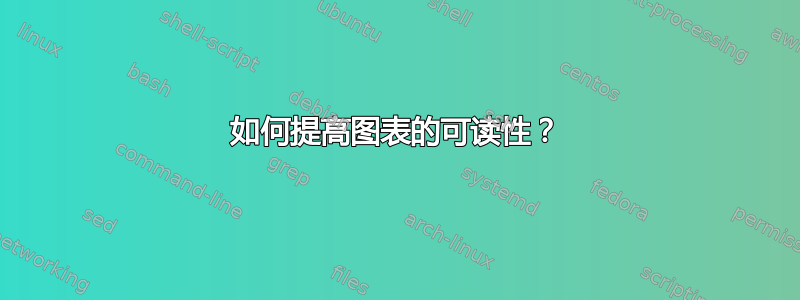
我经常需要解释当平均值为 1,2,3 $\sigma$ 时某个方差会发生什么。
这是 MWE。我正在寻找对 x 轴上节点的改进,我认为这些节点的可读性不是很好。
\documentclass[border =2mm]{standalone}
\usepackage[]{graphicx}
\usepackage[]{color}
%Paramètres
\def\KK{40} \def\VolY{0.20} \def\Kmin{20} \def\Ktick{40} \def\Kmax{60}
\begin{document}
%Boundaries
\def\TTOne{1}%
\pgfmathsetmacro{\RacineTT}{sqrt(\TTOne)}%
\pgfmathsetmacro{\VolTwo}{\RacineTT*\VolY}%
\pgfmathsetmacro{\TTwo}{\RacineTT*\VolY}%
\pgfmathsetmacro{\VolInKK}{sqrt(\TTOne)*\VolY*\KK}%
\pgfmathtruncatemacro{\KmThreeS}{round(\KK-3*\VolInKK)}%
\pgfmathtruncatemacro{\KmTwoS}{round(\KK-2*\VolInKK)}%
\pgfmathtruncatemacro{\KmOneS}{round(\KK-1*\VolInKK)}%
\pgfmathtruncatemacro{\KpOneS}{round(\KK+1*\VolInKK)}%
\pgfmathtruncatemacro{\KpTwoS}{round(\KK+2*\VolInKK)}%
\pgfmathtruncatemacro{\KpThreeS}{round(\KK+3*\VolInKK)}%
\tikzset{strike/.style={circle, scale=0.6, fill=white,draw=blue,opacity=1,draw=blue!50}}
\pgfplotsset{
/pgf/declare function={
GEuler(\x,\mean,\std) = 1/(\std*sqrt(2*pi))*exp(-((\x-\mean)^2)/(2*\std^2));
% MyGauss(\x) = GEuler(\x,44,4);
},
}
\pgfplotsset{
set layers,% using layers
mark layer=axis tick labels% defines the layer of the marks
}
\begin{tikzpicture}
\begin{axis}[
domain={\KK-3.5*\VolInKK}:{\KK+3.5*\VolInKK},
height=5cm,width=12cm, no markers,
samples=101, axis lines*=left,
every axis y label/.style={at=(current axis.above origin),anchor=south,},
every axis x label/.style={at=(current axis.right of origin),anchor=west,
},
y axis line style={draw opacity=0},
xtick={\KK},
xticklabels={$F=$ \textbf{\KK}},
ytick=\empty,
tick align=outside,
major tick length=2mm,
typeset ticklabels with strut,
enlargelimits=false,clip=false,axis on top,
clip mode=individual]
% filled areas at the sides
\addplot [fill=red!20,draw=none,domain=\KmThreeS:\KpThreeS] {GEuler(\x,\KK,\VolInKK)} \closedcycle;
\addplot [fill=blue!30,draw=none,domain=\KmTwoS:\KpTwoS] {GEuler(\x,\KK,\VolInKK)} \closedcycle;
\addplot [fill=blue!50,draw=none,domain=\KmOneS:\KpOneS] {GEuler(\x,\KK,\VolInKK)} \closedcycle;
\addplot [very thick,cyan!50!black,samples=201] {GEuler(\x,\KK,\VolInKK)};
\node at (axis cs:\KK,0) [strike,fill=red,draw=red] {\KK};
\node at (axis cs:\KmThreeS,0) [strike] {\KmThreeS};
\node at (axis cs:\KmTwoS,0) [strike] {\KmTwoS};
\node at (axis cs:\KmOneS,0) [strike] {\KmOneS};
\node at (axis cs:\KpOneS,0) [strike] {\KpOneS};
\node at (axis cs:\KpTwoS,0) [strike] {\KpTwoS};
\node at (axis cs:\KpThreeS,0) [strike] {\KpThreeS};
\end{axis}
\end{tikzpicture}
\end{document}
答案1
我只是放弃了一些axis on top节点并给了它们一些非平凡的东西fill opacity来达到
\documentclass[tikz,border =2mm]{standalone}
\usepackage{pgfplots}
\pgfplotsset{compat=1.16}
%Paramètres
\def\KK{40} \def\VolY{0.20} \def\Kmin{20} \def\Ktick{40} \def\Kmax{60}
\begin{document}
%Boundaries
\def\TTOne{1}%
\pgfmathsetmacro{\RacineTT}{sqrt(\TTOne)}%
\pgfmathsetmacro{\VolTwo}{\RacineTT*\VolY}%
\pgfmathsetmacro{\TTwo}{\RacineTT*\VolY}%
\pgfmathsetmacro{\VolInKK}{sqrt(\TTOne)*\VolY*\KK}%
\pgfmathtruncatemacro{\KmThreeS}{round(\KK-3*\VolInKK)}%
\pgfmathtruncatemacro{\KmTwoS}{round(\KK-2*\VolInKK)}%
\pgfmathtruncatemacro{\KmOneS}{round(\KK-1*\VolInKK)}%
\pgfmathtruncatemacro{\KpOneS}{round(\KK+1*\VolInKK)}%
\pgfmathtruncatemacro{\KpTwoS}{round(\KK+2*\VolInKK)}%
\pgfmathtruncatemacro{\KpThreeS}{round(\KK+3*\VolInKK)}%
\tikzset{strike/.style={circle, scale=0.6,
fill=white,fill opacity=0.8,text opacity=1,draw=blue!50}}
\pgfplotsset{
/pgf/declare function={
GEuler(\x,\mean,\std) = 1/(\std*sqrt(2*pi))*exp(-((\x-\mean)^2)/(2*\std^2));
% MyGauss(\x) = GEuler(\x,44,4);
},
}
\pgfplotsset{
set layers,% using layers
mark layer=axis tick labels% defines the layer of the marks
}
\begin{tikzpicture}
\begin{axis}[
domain={\KK-3.5*\VolInKK}:{\KK+3.5*\VolInKK},
height=5cm,width=12cm, no markers,
samples=101, axis lines*=left,
every axis y label/.style={at=(current axis.above origin),anchor=south,},
every axis x label/.style={at=(current axis.right of origin),anchor=west,
},
y axis line style={draw opacity=0},
xtick={\KK},
xticklabels={$F=\mathbf{\KK}$},
ytick=\empty,
tick align=outside,
major tick length=2mm,
typeset ticklabels with strut,
ymax={GEuler(\KK,\KK,\VolInKK)+0.001},
enlargelimits=false,%clip=false,axis on top,
clip mode=individual]
% filled areas at the sides
\addplot [fill=red!20,draw=none,domain=\KmThreeS:\KpThreeS] {GEuler(\x,\KK,\VolInKK)} \closedcycle;
\addplot [fill=blue!30,draw=none,domain=\KmTwoS:\KpTwoS] {GEuler(\x,\KK,\VolInKK)} \closedcycle;
\addplot [fill=blue!50,draw=none,domain=\KmOneS:\KpOneS] {GEuler(\x,\KK,\VolInKK)} \closedcycle;
\addplot [very thick,cyan!50!black,samples=201] {GEuler(\x,\KK,\VolInKK)};
\node at (axis cs:\KK,0) [strike,fill=red,draw=red] {\KK};
\node at (axis cs:\KmThreeS,0) [strike] {\KmThreeS};
\node at (axis cs:\KmTwoS,0) [strike] {\KmTwoS};
\node at (axis cs:\KmOneS,0) [strike] {\KmOneS};
\node at (axis cs:\KpOneS,0) [strike] {\KpOneS};
\node at (axis cs:\KpTwoS,0) [strike] {\KpTwoS};
\node at (axis cs:\KpThreeS,0) [strike] {\KpThreeS};
\end{axis}
\end{tikzpicture}
\end{document}
请注意,axis cs:在 pgfplots 版本1.11或更高版本中是不必要的,但我保留了它们。因此,如果您想将其嵌入到更大的文档中,请考虑遵循 frougon 的建议并将定义设为本地。
\documentclass[tikz,border =2mm]{standalone}
\usepackage{pgfplots}
\pgfplotsset{compat=1.16}
\begin{document}
\begin{tikzpicture}[declare function={
GEuler(\x,\mean,\std)=1/(\std*sqrt(2*pi))*exp(-((\x-\mean)^2)/(2*\std^2));}]
\def\KK{40} \def\VolY{0.20} \def\Kmin{20} \def\Ktick{40} \def\Kmax{60}
%Boundaries
\def\TTOne{1}%
\pgfmathsetmacro{\RacineTT}{sqrt(\TTOne)}%
\pgfmathsetmacro{\VolTwo}{\RacineTT*\VolY}%
\pgfmathsetmacro{\TTwo}{\RacineTT*\VolY}%
\pgfmathsetmacro{\VolInKK}{sqrt(\TTOne)*\VolY*\KK}%
\pgfmathtruncatemacro{\KmThreeS}{round(\KK-3*\VolInKK)}%
\pgfmathtruncatemacro{\KmTwoS}{round(\KK-2*\VolInKK)}%
\pgfmathtruncatemacro{\KmOneS}{round(\KK-1*\VolInKK)}%
\pgfmathtruncatemacro{\KpOneS}{round(\KK+1*\VolInKK)}%
\pgfmathtruncatemacro{\KpTwoS}{round(\KK+2*\VolInKK)}%
\pgfmathtruncatemacro{\KpThreeS}{round(\KK+3*\VolInKK)}%
\begin{axis}[
set layers,% using layers
mark layer=axis tick labels,% defines the layer of the marks
domain={\KK-3.5*\VolInKK}:{\KK+3.5*\VolInKK},
height=5cm,width=12cm, no markers,
samples=101, axis lines*=left,
every axis y label/.style={at=(current axis.above origin),anchor=south,},
every axis x label/.style={at=(current axis.right of origin),anchor=west,
},
y axis line style={draw opacity=0},
xtick={\KK},
xticklabels={$F=\mathbf{\KK}$},
ytick=\empty,
tick align=outside,
major tick length=2mm,
typeset ticklabels with strut,
ymax={GEuler(\KK,\KK,\VolInKK)+0.001},
enlargelimits=false,%clip=false,axis on top,
clip mode=individual]
% filled areas at the sides
\addplot [fill=red!20,draw=none,domain=\KmThreeS:\KpThreeS] {GEuler(\x,\KK,\VolInKK)} \closedcycle;
\addplot [fill=blue!30,draw=none,domain=\KmTwoS:\KpTwoS] {GEuler(\x,\KK,\VolInKK)} \closedcycle;
\addplot [fill=blue!50,draw=none,domain=\KmOneS:\KpOneS] {GEuler(\x,\KK,\VolInKK)} \closedcycle;
\addplot [very thick,cyan!50!black,samples=201] {GEuler(\x,\KK,\VolInKK)};
\begin{scope}[nodes={circle, scale=0.6,
fill=white,fill opacity=0.8,text opacity=1,draw=blue!50}]
\node at (\KK,0) [fill=red,draw=red] {\KK};
\node at (\KmThreeS,0) {\KmThreeS};
\node at (\KmTwoS,0) {\KmTwoS};
\node at (\KmOneS,0) {\KmOneS};
\node at (\KpOneS,0) {\KpOneS};
\node at (\KpTwoS,0) {\KpTwoS};
\node at (\KpThreeS,0) {\KpThreeS};
\end{scope}
\end{axis}
\end{tikzpicture}
\end{document}




